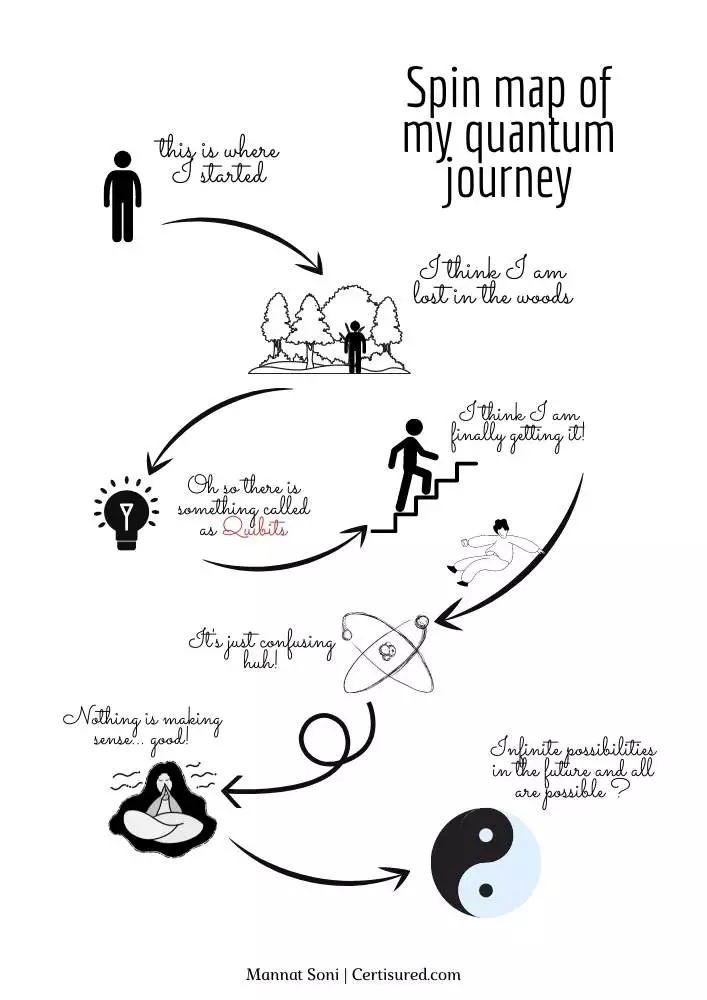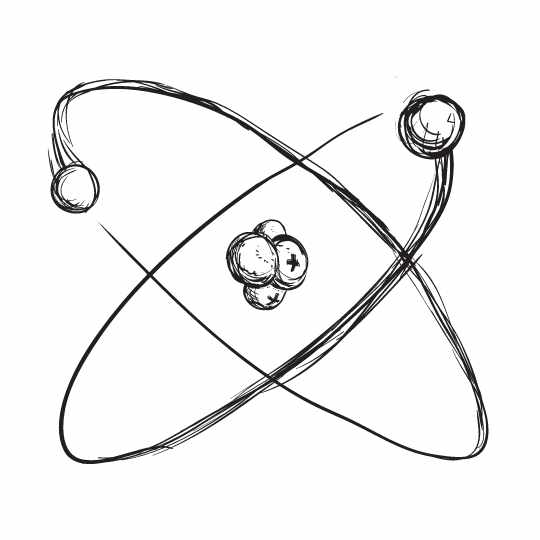Quantum Computation
Quantum Computers : Will they replace the classical ones?
QUANTUM COMPUTING
Learning about quantum computing. Wow, what a classic, oh sorry, quantum idea!
No they are not the same, and no they are not replaceable! Did you always think quantum is the better version of classic? Let’s explore!
Before we dive in into depths of the unknown, let me first give you a heads-up, as beginners, where we actually stand.
Here is the roadmap or as I should say spin map of my quantum journey.

My physics teacher once said, quantum computers will make very bad community leaders, never elect them, because they are never totally sure what values they hold!
Wait for it!
Now by the time it was 1981, Quantum theory had matured. Computer science was evolving. Computers were being used extensively for physical computations and were doing pretty good under the record. Then where was the need of quantum computers felt? Why and how did it all begin?
HISTORY CLASS 101 | Timeline 1982
So back in the old days, whenever a scientist would want to review an experiment or would want to rerun to find better and polished results, thier go-to buddy was a classic computer. But processes that involved huge computations became slow and inefficient to perform. That’s when Feynman introduced the idea as to why do physicists need computers that can perform computation exponentially!
So he placed the following questions on the table:
- Can classical physics be simulated by a classical computer?
- Can quantum physics be simulated by a quantum computer?
- Can physics be simulated by a quantum computer?
- Can a quantum simulation be universal?
Timeline 1985
The next step was “Quantum Turing Machine”. He brought the concept of Quantum parallelism based on superposition principle. He proposed that QTM can encode many inputs on the same tape and perform the calculations simultaneously.
Just so that you don’t lose me here:
- Quantum Turing Machine- A simple model to capture quantum computation.
- Quantum Parallelism- It is a consequence of superposition that discusses the resulting increase in the computational speed exponentially than linearly
(like in classical computers). He brought the idea that the inefficiency of classical computers could be overcome by quantum computers? Had we found a replacement of classical computers? No more 1’s and 0’s?
Timeline 1994
It was time for the master minds to put that bulky organ on top to some good use. And then we had our very first quantum algorithm. By exploring the power of quantum parallelism Peter Shor figured out an algorithm for quantum computers to find out prime factorization beating the time taken on classical computer exponentially.
Timeline 1996
Then we had another ground-breaking algorithm written by Grover that was capable of searching a single item in an unsorted database in square root of a time it would take on a classical computer. Since searching in database and prime factorization are central themes in Computer science, Shor and Grover’s work brought intense simulation to the world of Quantum computers. It made them extremely exciting and they started growing rapidly. And that’s how quantum computers became the new thing of the generation.
Now we know who brought the idea & we know what algorithms gave it their first break.
But what actually is Quantum Computing?
If I were to express it poetically...
Quantum theory fell in love with computer science.
And as they say, extraordinary love changes the world; quantum computation was born. According to Wikipedia, quantum computing is the use of quantum mechanical phenomena such as super positions and entanglement (we will talk about them in a bit), to perform computation. The computers that perform quantum computations are called quantum computers. Quantum mechanics involve quantum particles and they work by controlling the behavior of these particles.
On what principles does this magic happen?
The basic principles of quantum computing is the same as that of quantum theory.
SUPERPOSITION+ENTANGLEMENT
Superposition: Superposition is a way to describe the movement of particles when it has no real world equivalence. All particles exist in the superposition until they are measured. They can be anywhere anytime.
Entanglement: It is a phenomena in which quantum entities are created and/or manipulated such that none of them can be described without referencing it to the other. Individual entities are lost.
The process involves entanglement of qubits and probabilities with superposition to carry out certain series of operations in order to find the result.
Brace yourself because I am sure you can feel things slipping out of your hands.
I can here your inner voice scream , "what on earth are qubits now"?
Think with me now.
The ones who are familiar with the world of computers out of interest or because you are simply doing computer science / engineering would know that a classical computer works on two binary inputs, 0’s and 1’s called bits. Our old pals!
But a quantum computer does it using quantum bits, or as we all call it “Qubits”. A Qubit can be 0, or 1, or 0 and 1 at the same time. It has more fluid, non-binary identity.
This is what gives quantum computing its superior computing power.
What are qubits made of?
They are usually electrons, photons or nucleus. We shall consider outer most electron of phosphorous as our qubit. Because of the spin of the electron, it causes a magnetic field. This makes them tiny bar magnets which allows them to align in a magnetic field.
Now when this alignment is in its lowest state we call it a 0 and to bring it to its highest state i.e. 1, we apply some external force.
They are special, they can exist in dual states at one time. That is, when we measure it, it can be in up or down position. But before we measure, it will exist in the so called “quantum superposition”.
Quantum superposition arises because at the quantum scale, particles behave like waves. Similar to the way that multiple waves can overlap each other to form a single new wave, quantum particles can exist in multiple overlapping states at the same time giving them multiple positions.

Qubits exists with some probability of being 0 and some of being 1. These constants indicate the relative probabilities of finding the electron in one state or the other. As we all know interaction is the rule of nature. For anything to exist, it has to interact. Hence, it’s hard to imagine the incredible power of quantum computing into action without interaction of two quantum bits. That’s where entanglement comes into picture. This leads to the information traveling faster than the speed of light. This happens because measurement on one member of the entangled pair will immediately determine measurement on the other. But it’s not that simple.
Although the qubits can exist in any combination of states, when they are measured they must fall into one of the bases state. The states that are measurable. And all the information of the state before measuring it, is lost. So as a result we do not desire a very complicated, unmeasurable superposition state. The idea is to design the logic operations which we need to get to the final computational results in such a way that the final result is measurable. The important part is that these gates have to be reversible. This helps us in knowing the inputs when we know the outputs. This helps us in not losing the important data while processing. We need to do this because we need to keep the quantum computers in a state of superposition long enough to explore all the possibilities to arrive at a final answers.
The possibilities of qubits existing through probabilities gives us more number of steps to perform an operation.
It is not about every operation performed, it is about number of operations performed.
In quantum computing, the number drops exponentially. Thus giving us a revelation!
This brings us back to our very first question, are quantum computers a replacement for classical computers? No!
This is because Quantum computers are not universally faster. They are only faster for particular operations where we can use computational analysis. There are many computations that a classical computer would perform better than a quantum one. Which is why it is not a replacement of a classic computer.
Has Quantum computation confused you? If it has it means you are getting it.
What now?
Every idea has a future.
Quantum computer has a potential still unknown. So what does the future hold for us?
- Private Keys- These can be used to encrypt private messages going from one location to another. Because of so many possible patterns of qubits and quantum uncertainty hackers won’t be able to trace exact keys without breaking the quantum rules. Quantum encryption is the new future for cyber security.
- Health and Medicine- Analyzing and developing drugs has always been the challenging tasks. Describing all of the quantum properties of each and every molecule in this world is a computational task way beyond the scope of any computer. But since QC works on these principles, we will be able to align possibilities and find cures for many harmful and incurable diseases.
- Teleportation of information- Entanglement allows us to transfer information way faster. Thus without actually sending the information we might be able to exchange it in the near future thus saving so much of duplicate and unwanted data.
Introduction of quantum computation has opened a lot of domains for future discoveries. We need to understand that quantum computation has opened the doors of having multiple future for each moment. Because of quantum mechanics, we could possibly have infinite presents, Infinite universes, infinite possibilities.
We humans, with our great imagination and inquisitiveness have the capability to discover the unknowns. Let the future of quantum computation bring more possibilities to life. Let this be a way for us to reach to corners of the universe still hidden from us. Nature has always been beyond the scope of human brains. The future is fundamentally uncertain and to me, that’s certainly exciting.
